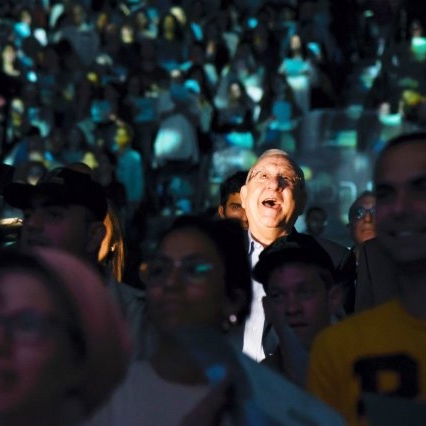
SA

Koolulam says South Africans need to ‘live a little and be free’
NICOLA MILTZ
During a three-day reconnaissance to the country to arrange the tour recently, Koolulam co-founder Or Taicher, 33, concluded that South Africans are “very serious, inhibited people, who need to live a little and be free”.
While arranging the mammoth logistics for Koolulam’s upcoming Johannesburg tour, Taicher told the SA Jewish Report that “South Africa really needs Koolulam!”
“I have breathed the same air as the people of Johannesburg. I have seen the look on people’s faces. Now I ask the question: when was the last time you really experienced true joy? When was the last time you truly lived?”
According to its promotional material, Koolulam is a social-musical initiative aimed at strengthening the fabric of society. In less than two years, Koolulam has literally taken Israel by storm, and at the last count, its online viewership numbered more than 50 million people.
Koolulam organises mass singing events in which large groups of people come together to form a collaborative musical creation. The South African event in October is aiming to reach 4 000 people and pack a hall at the Sandton Convention Centre – marking Koolulam’s first international gig.
Each mass gathering is unique, with the aim of creating social harmony where it is most needed, says Taicher, Koolulam’s artistic and creative director.
Taicher wears shorts and flip flops for his interview, his standard business attire, he says. He is laid back and casual, but has an euphoric and contagious energy about him – exactly like a Koolulam event – something that has to be seen to be believed.
He has no airs or graces, embodying the spirit of a project which sees everyone as the same – from presidents and celebrities to you and me.
At every Koolulam event, the audience becomes the performer.
“You bring your voice. It’s not about the quality of the voice, it’s about bringing your voice to the group,” he says.
The audience is split into three different vocal groups –baritone, alto, and soprano. The conductor leads an intense musical session, and thereafter, singers and musicians come together to perform the song. Super-cool, dreadlocked, Ben Yaffet, 27, the co-founder, principal conductor, musical director, and content creator of Koolulam, leads the song. The performance is combined with a stupendous backdrop of lighting and earth shattering sound effects.
Every event is filmed by a professional crew. The powerful cinematic video is then distributed online, where it is intended to inspire more people to come together in “one big ensemble of humanity”, Teicher says. The result, he says, is an “overwhelmingly uplifting and empowering experience of human interaction and co-operation”.
The Koolulam team sees itself as social activists devoted to shared healing.
“Our aim is to bring people together from all walks of life to do one thing: stop everything for a few hours and just sing – together. To feel pain, to feel joy, to unite – that is what Koolulam is about,” says an impassioned Taicher.
It did just that on 14 June 2018 on Eid-al-Fitr, the festival that marks the end of the 40-day Ramadan fast. Seven hundred people crowded into Jerusalem’s ancient David’s Citadel, to take part in a Hebrew, English, and Arabic “Koolulam” song-mob rendition of Bob Marley’s One Love.
The Jerusalem event was advertised on social media, and tickets were just 40 shekels (R125), “the cost of three coffees in Israel”, Taicher says. They sold out in less than 10 minutes.
The evening was sponsored by the Tower of David Museum and Jerusalem.com with the co-operation of faith leaders and more than 50 other local and international dialogue and interfaith organisations. It was held in honour of Kyai Haji Yahya Cholil Staquf of Indonesia, the head of the 60-million-member Nahdlatul Ulama, the world’s largest Muslim organisation.
“The event took place at midnight. Just imagine, rabbis, sheiks, and priests singing Bob Marley’s song in three different languages. It was incredible. There was immense joy in singing together,” he says. The event inspired musical harmony which he hopes will linger to inspire “harmony in humanity”.
Co-founder, Michal Shahaf, 34, the General Manager of Koolulam, is in charge of the project’s overall activity, including strategy, PR, media, community management and communications. She is a digital expert and entrepreneur. Recently, she said, “A Koolulam participant cannot help but feel more trusting of their fellow human after such an experience. This not only leads to people being kinder to one another, but to people being more hopeful, which leads to people being courageous. And our world needs kinder, hopeful, and courageous people.
April’s Koolulam event in Tel Aviv went viral after 12 000 people, including President Reuven Rivlin, participated in Tel Aviv’s Menorah Mivtachim Arena to sing Naomi Shemer’s Al Kol Eleh for Israel’s 70th anniversary.
In its first year, Koolulam received the prestigious Jerusalem Unity Prize in the presence of Rivlin. The Asia Society awarded Koolulam the prestigious Game Changer Award of 2018, and this is just the beginning.
Koolulam has organised more than a dozen events across Israel, including groups of cancer patients undergoing treatment in hospital and their medical staff, and Holocaust survivors, their children and grandchildren.
At every Koolulam event, a different, well-known song is chosen to be performed. The song chosen for the South African event – known to the SA Jewish Report – is a closely guarded secret which will be announced next week.
“Our musicians put together a fresh and innovative arrangement of the chosen song. We will work hard to get the true essence of the South African people.”
Musicians will write and re-write a new instrumental arrangement, as well as an original three-part vocal arrangement.
“I am going to devote my heart and energy to the people of South Africa. There is no doubt this event is going to be unique,” says Taicher.




